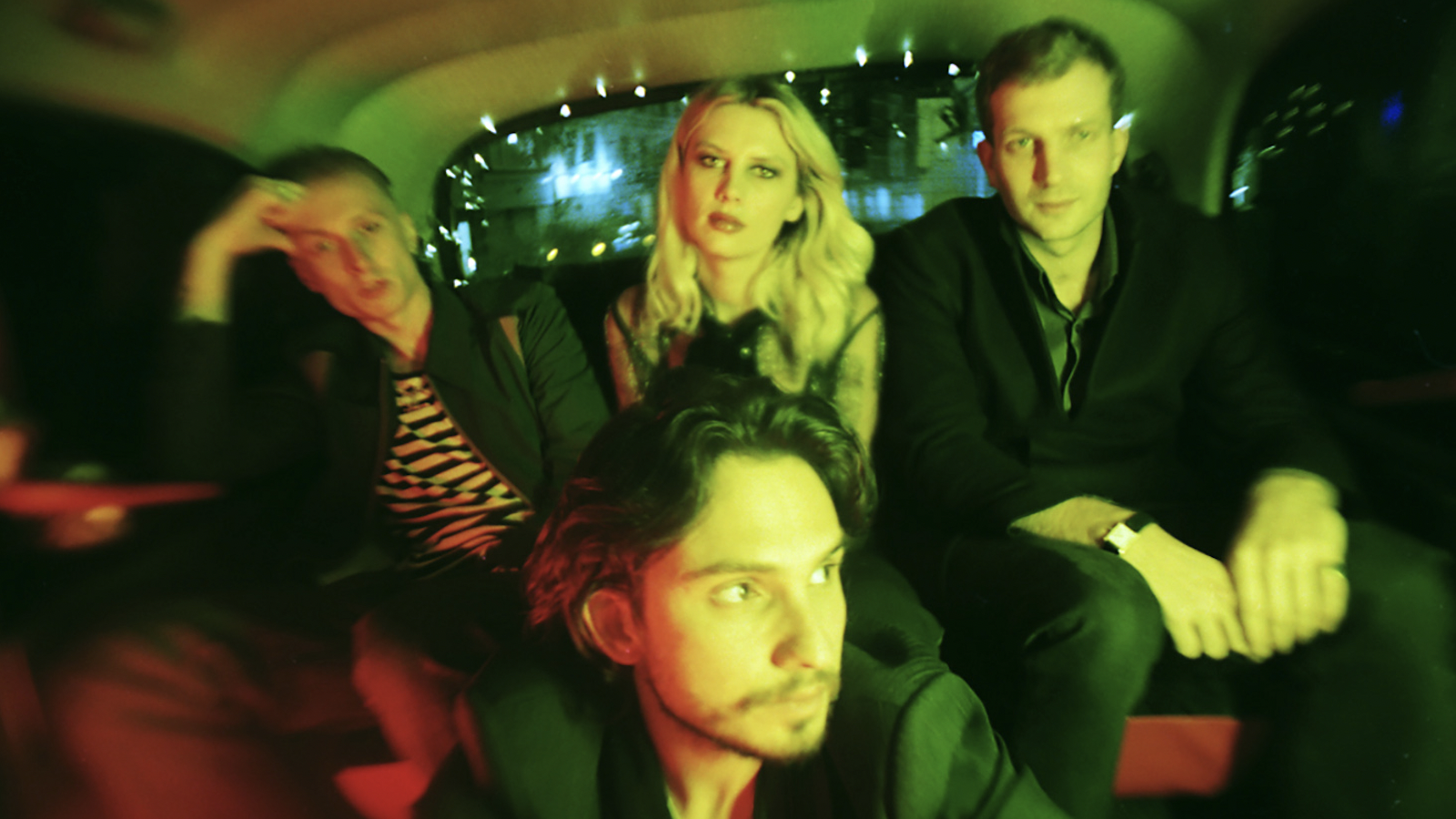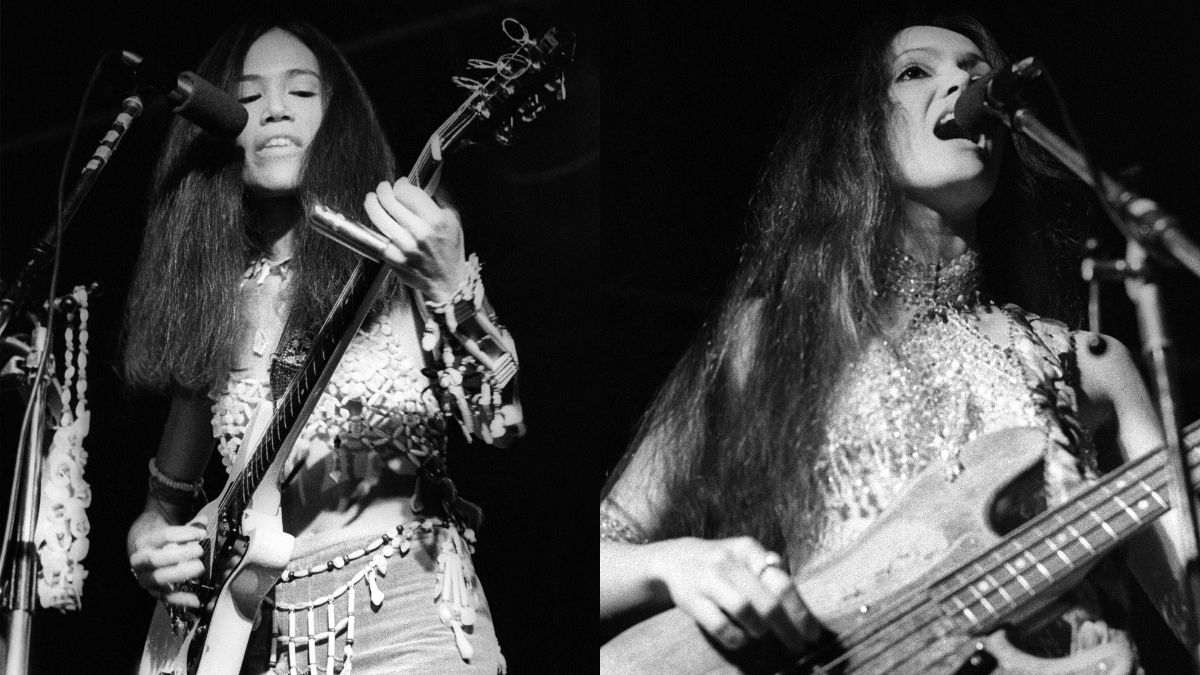Wolf Alice’s Ellie Rowsell and Joff Oddie: “It almost felt like we were having the ‘difficult second record’ on the third one”
Following a well-earned rise to stardom, UK alt-rockers Wolf Alice leap to even grander heights with their dreamy and deep new album, Blue Weekend

All the latest guitar news, interviews, lessons, reviews, deals and more, direct to your inbox!
You are now subscribed
Your newsletter sign-up was successful
The 2010s paved the way for some of the rock world’s biggest and best acts to thrive, with the advent of streaming services, a resurgence in the popularity of festivals, and landmark developments in artist-to-fan connections all at the forefront of a new golden age for the alternative scene. Wolf Alice took full advantage of music’s mid‑decade cultural shift, and with their 2015 full‑length debut, My Love Is Cool, established themselves as one of the bands Gen Z would be foolish to ignore. 2017’s Visions Of A Life only amped up the hype, scoring widespread critical acclaim, a Silver certification in their native UK, and the 2018 Mercury Prize.
In less than a decade, Wolf Alice soared from nonchalant acoustic-folk duo to one of the most influential names in modern music. So when it came time to round out their trilogy of heavy‑hitting indie‑rock epics, the quartet buckled under the weight of burnout. After a short hiatus, they tucked away in the cozy hills of Somerset, south-west England, where they embraced life away from the spotlight and grew their personal friendships, jamming out in a converted church without any pressure to meet certain expectations or deadlines.
So brings us to Wolf Alice’s transcendent third album, Blue Weekend: an evocative exploration of the self driven by bold, authoritative instrumentals and the most open-hearted songwriting frontwoman Ellie Rowsell has committed to record. It’s an album well worth the four-year wait – and according to Rowsell and guitarist Joff Oddie, that extra time was crucial in allowing the record’s unapologetic fierceness to ferment.
What made you guys want to step back and take a little more time with this one?
Joff: I don’t think there was a big master plan with it, really. We didn’t really have a gap between the first and second records, so when it came to the end of the touring cycle for [Visions Of A Life], we were just beat. We needed to take a little respite – which wasn’t even that long, it was only about three months before we started work on [Blue Weekend]. But this one definitely took a lot longer to grapple with – the second record came very quickly and very easily, so it almost felt like we were having the ‘difficult second record’ on the third one.
Why was that?
Joff: I think it just took longer – not that it was painful or particularly horrible in any parts. It just took us a lot longer to feel like we were there, I think. And the recording took a lot longer than we thought it would have.
Was that due to you wanting to explore some new things, or approach the creative process differently in any way?
Ellie: I think we were really lucky, because our label and management really helped to reinforce the message that, like, this was a really important record. We needed to get to a place where we felt good about it and we were happy with it, and not worry about how long that would take. They’ve always said that to us, but it really mattered with this album. We had no other distractions, and we just worked on it until we felt like it was finished. But I mean, some people take years and years to make records, so I don’t think it was a crazy long time.
Do you think that led to a better record at the end of the day?
Ellie: I don’t think time always leads to a better record, but yeah, maybe it did. We have always worked to a timeline before, and I think that served us well in the past, but it was definitely nice to be able to go, “That sounds good, but should we try it again in a different way?” Normally we’d just be like, “Oh that sounds good, let’s move on.” And I found that process was quite hard – it’s hard to know when to stop, and it’s hard to work with no other distractions – but I do think the record benefited from it.
All the latest guitar news, interviews, lessons, reviews, deals and more, direct to your inbox!
I love a lot of the contrasting vibes on this record – on “Delicious Things” and “The Last Man On Earth”, there’s this proggy, psychedelic, almost Floydian vibe, but then “Play The Greatest Hits” is all big, fat, ‘90s grunge and punk. I know it’s such a cliche question, but what were you inspired by for this record?
Ellie: I think we always struggle with that question, because we wrote and rehearsed and recorded this album over such a long span of time. It’s hard to pinpoint exactly what our inspirations were, musically. They were all kind of subconscious, I think – there weren’t any obvious things that we referenced in the studio.
Joff: I think the thing we’re always chasing in the studio, as a reference point, is a feeling. And I think that can be quite hard to explain – especially to a producer, because it takes some time to build that relationship up and be able to talk in that way, and kind of get each other. But we very much have that between the four of us [in the band], and have done for a long time now.
It’s always been about chasing emotions, and we know when we’ve accomplished that. It’s kind of hard to know sometimes if it feels wrong, but when it really hits the mark, we’re all like, “Oh yeah! That’s what we were after with this!” You just feel a certain way. It can be very confusing in the studio, but it’s crucial to the process.
Musically speaking, Wolf Alice has always had that very atmospheric and crystalline slant, but this album ups the ante a little bit. Was that dream-pop vibe something you were keen to dip into a little deeper on LP3?
Ellie: I don’t know if ‘dream-pop’ is the term I would use, but I definitely think we like things to feel cinematic and atmospheric. Someone described this album to me as ‘widescreen’ the other day, and unless I completely misunderstood them, I was like, “Yeah, totally!” I kind of like that. But I do like both of those words – ‘dream’ and ‘pop’ – so maybe.
So how did that play into the way you guys approached the guitars on this album? Did you see an opportunity to explore any new techniques or playing styles?
Joff: It’s interesting… Obviously my job as the guitar player is going, “Okay, what can guitars do to benefit this song, and to benefit the emotional content in it?” And it feels like a really nice place to be at the moment, because going into this record, it felt like we had a bunch of tricks we’d learnt from the first two records.
We knew worked, and what we were happy and comfortable with – things like making ambient tones and soundscape-y things, different techniques with different pedals and amps and stuff… Even basic things like layering fuzzes across the stereo field. So there was a confidence we had going into it, which kind of allowed me to get a little bit funky with acoustic instruments.
There are quite a few instances on [Blue Weekend] where we’ve got lots of layered up, kind of odd acoustic instruments, like tenor resonators and banjos, acoustically mic’d up electric guitars, classical guitars and 12-strings. Also, something that Markus Dravs [producer] instilled in us was that it doesn’t really matter where a good guitar sound comes from; if it’s a good guitar sound, then it’s a good guitar sound.
For example, I don’t know if I’m bursting any bubbles here, but the guitar solo in “Last Man On Earth” is just DI’d straight into a really standard interface – it’s the most basic Logic amp and pedal presets. There’s a bunch of songs that use that kind of stuff – and it’s cool. There’s a bunch of songs that have silly multi-amp and multi-pedal setups that are a lot more elaborate, but it doesn’t always have to be that way.

Ellie Robinson is an Australian writer, editor and dog enthusiast with a keen ear for pop-rock and a keen tongue for actual Pop Rocks. Her bylines include music rag staples like NME, BLUNT, Mixdown and, of course, Australian Guitar (where she also serves as Editor-at-Large), but also less expected fare like TV Soap and Snowboarding Australia. Her go-to guitar is a Fender Player Tele, which, controversially, she only picked up after she'd joined the team at Australian Guitar. Before then, Ellie was a keyboardist – thankfully, the AG crew helped her see the light…
